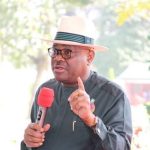The United States Government has seized a $3m mansion belonging to former Gambian President, Yahya Jammeh in the state of Maryland, near Washington DC.

Yahya Jammeh’s US Mansion
A court in the US ruled that the mansion should be seized from a trust set up by him, according to a report by British Broadcasting Corporation (BBC) on Friday.
The court argued that the six-bedroom house was acquired through proceeds of corruption from the West-African nation during Jammeh’s reign.
One of the agents overseeing the case filed in 2020 against the former leader, Selwyn Smith, told the BBC; “Maryland real estate is not a shelter for funds for corrupt rulers who have stolen from their countrymen.”
Following the ruling, U.S authorities directed that funds raised from the sale of the house would be used to benefit those who were harmed by the former president’s “acts of corruption and abuse of office.”
“The United States intends to sell the property, and recommend to the Attorney General that the net proceeds from the sale of the forfeited property be used to benefit the people of Gambia harmed by former President Jammeh’s acts of corruption and abuse of office,” the Department of Justice (DOJ) said.
Jammeh’s 22-year presidency, which ended in 2017, was notorious for corruption and he also faced allegations of extensive human rights abuses including killing and jailing his critics.
The seizure follows Gambia government’s resolution on Wednesday to prosecute Jammeh, who fled to Equatorial Guinea, for killings and other suspected crimes from his time in office; this is despite the leader denying allegations of wrongdoing.
Jammeh, over the course of his 22 years in power, also faces allegations of extensive human rights abuses including killing and jailing his critics.
He assumed leadership in a 1994 coup, and was forced out after losing a 2016 election to the current president, Adama Barrow, before fleeing the country.
This comes a few months after Yahya Jammeh was alleged to be responsible for the killing of West African migrants, including nine Nigerians in 2005.




![Gospel Singer, Sola Allyson Breaks Down In Tears Over Criticism for Not Mentioning ‘Jesus’ in Her Songs [Video] 5 Gospel Singer, Sola Allyson Breaks Down In Tears Over Criticism for Not Mentioning ‘Jesus’ in Her Songs [Video]](https://media.kanyidaily.com/2025/03/29193024/Sola-Allyson-150x150.webp)










